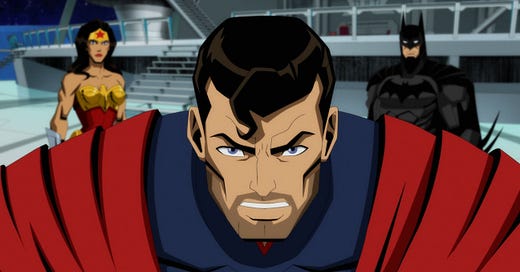Spoiler alert. I tire of alerting my readers of spoilers; the lion’s share of my future Substack posts will consist of my philosophical engagement with literature and art. My blog posts, truth be told, are written for my own benefit. Any utility derived therefrom by my readers is absolutely secondary. As the line in Rush’s Anthem goes, “Yet it was for me not you. I came to write this song.”
TL;DR: spoilers should be assumed moving forward.
Injustice is a favorite DC animated movie among many libertarians. The plot describes Superman’s rapid descent from do-gooder to a tyrannical man of the system, in Smithian terms, or a global leviathan, in Hobbesian ones. Why does the American Man of Steel decide to emulate the real-life Soviet “man of steel”? Grief: Joker tricks Clark Kent into killing Lois Lane and detonating a thermonuclear warhead in Metropolis, evaporating 11 million people instantaneously. Clark blames Batman’s deontological commitment to never kill as responsible for Joker being alive to orchestrate his scheme, and, more broadly, the problem of evil stubbornly refusing to disappear from the planet. Superman then takes it upon himself to eradicate all violence from the face of the planet with… overwhelming force. He chalks up casualties incurred and unjust means as necessary to arrive at his end: world peace.
A decidedly utopian vision, as it never comes to pass, nor can it.
When ideating plans for a better future, one mustn’t ignore the switching costs that will be incurred when moving from one state to another. The political order, just like the economic one, is a dynamical system. A stable, static equilibrium will never come to pass. Therefore, one ought to be supremely circumspect (read: must not) when justifying admittedly evil means to achieve a just end. There is no end of history; there is no end state for the system of the world.
Needless to say, authoritarians of all stripes—high-modernists, fascists, theocrats, technocrats, communists, and socialists—would do well to remember that the road to hell is paved with good intentions. But so would libertarians. Although the system for which libertarians advocate is just, unlike its authoritarian counterparts, the means employed to arrive at this system can be equally unjust. The moral costs1 incurred from forcibly moving from a state of injustice to one of justice can be as great or greater than the injustice of the present system.
I, for one, will abstain from being a systemitizer. Instead, I endeavor to practice those virtues necessary to achieve my values in whatever system I happen to find myself in.
I have yet to come up with a wittier, pithier phrasing. Apologies.




